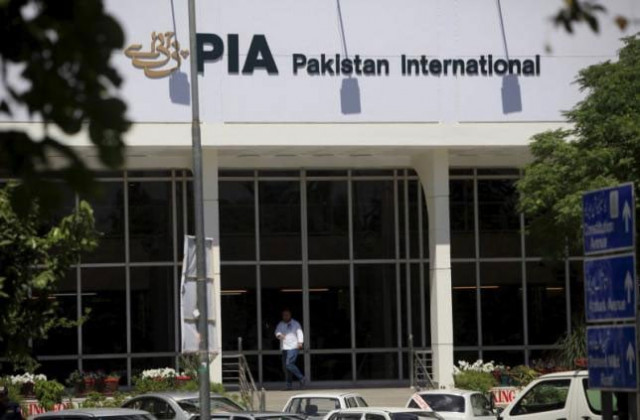A man enters the Pakistan International Airlines (PIA) office in Islamabad, Pakistan, April 12, 2016. PHOTO: REUTERS
LAHORE:
The dispute between the management of Pakistan International Airlines (PIA) and the Society of Aeronautical Engineers of Pakistan (SAEP) escalated further on Wednesday when the national airline transferred six aeronautical engineers from Peshawar to Karachi, drawing vehement criticism from the engineering body.
The transfer orders came as the airline continued to deal with widespread flight delays and cancellations at major airports, leaving passengers stranded and frustrated across the country.
PIA’s flight schedule remained severely affected with several domestic and international routes affected.
At Lahore’s Allama Iqbal International Airport, flights PK303 to Karachi and PK302 from Karachi have been cancelled. Flight PK305 to Karachi was delayed by six hours, while flight PK248 from Dammam to Lahore was delayed by 22 hours.
At Islamabad International Airport, flight PK601 to Gilgit was cancelled, as were PK602 and PK604 from Gilgit to Islamabad. Jeddah-bound PK741 was delayed by four hours, while flights to Karachi and Skardu were also delayed.
At Karachi’s Jinnah International Airport, flights PK302 and PK306 bound for Lahore were cancelled. PK501 to Turbat was delayed, PK304 to Lahore was delayed ten hours and PK370 to Islamabad was delayed three hours.
At Peshawar’s Bacha Khan International Airport, flight PK218 to Doha and return flight PK286 from Doha were delayed by 18 hours each.
‘Not on strike’
Meanwhile, the Society of Aeronautical Engineers of Pakistan (SAEP) issued a statement rejecting claims of an attack, clarifying that its members would “never compromise flight safety or airworthiness standards.”
“All engineers are on duty and performing their responsibilities strictly in accordance with aviation technical and safety standards,” the SAEP spokesperson said.
The Corps of Engineers stated that they were only authorizing aircraft that were deemed fully fit and airworthy, while any aircraft that had technical or safety issues would remain grounded in accordance with international safety standards.
The statement states that passenger and flight safety will not be subject to any pressure or coercion, adding that engineers “will not deviate from safety standards at any cost.”
The SAEP also expressed concern over the management’s recent actions, including the transfer of six engineers from Peshawar to Karachi, calling it “an unnecessary move” that threatened to worsen the situation.
Rejecting rumors that the engineers were opposed to the privatization of the airline, the SAEP spokesperson said it was incorrect to assume that the engineers were against the move. “They support it, as long as the national airline is provided with a stable and professionally managed structure.”
The association further demanded a salary increase after eight years and timely supply of aircraft spare parts to ensure continued compliance with global aviation standards.
“The SAEP remains committed to keeping Pakistan’s aviation sector safe, professional and aligned with international benchmarks,” the spokesperson said.
Meanwhile, Parliamentary Secretary for Defense Zeb Jaffar on Wednesday informed the National Assembly that Pakistan International Airlines (PIA) had posted a profit for the first time in almost two decades, marking a significant turnaround in its financial performance.
Responding to questions during the session, he said the airline had been operating at a loss for more than 20 years but started posting profits in 2022.
According to Zeb Jaffar, PIA earned Rs 23.4 billion in 2022 and Rs 6.8 billion in H1 2023 due to improved operational efficiency and workforce restructuring. “An organization that was in losses for two decades is now reporting profits. We have streamlined operations to ensure long-term sustainability,” he said.
Highlighting the airline’s progress, he said PIA had reopened several domestic routes and was operating efficiently in both the local and international sectors. “Previously the airline operated 32 aircraft, but now it operates effectively with only 17,” he added.
Zeb Jaffar said these improvements reflect the government’s commitment to reform and sustainability in the aviation sector.
However, he noted that despite the recovery and better performance, privatization of PIA had become necessary due to its heavy liabilities and past setbacks.
He said restoring PIA’s credibility in the international aviation community was a major challenge, but the airline had managed to rebuild its reputation and resume international operations.
“Several routes have become profitable again and PIA has regained its value as a national asset,” he added.
Zeb Jaffar emphasized that given the airline’s financial burden and accumulated liabilities, privatization was the most practical step to ensure long-term stability. “The federal Cabinet decided to privatize PIA after a thorough analysis of all aspects,” he said.
Replying to another question, he clarified that PIACL had not received any rescue package of Rs 24,000 crore. Instead, the airline obtained this amount as bridging financing facilities from the Civil Aviation Authority of Pakistan in different tranches to sustain operations during severe cash flow constraints.
“As part of the ongoing debt restructuring process, Rs 17 billion of this amount has been transferred to PIAHCL, while Rs 7 billion remains with PIACL and is still payable,” he explained.
The president referred the matter to the relevant committee at the request of the promoter.




